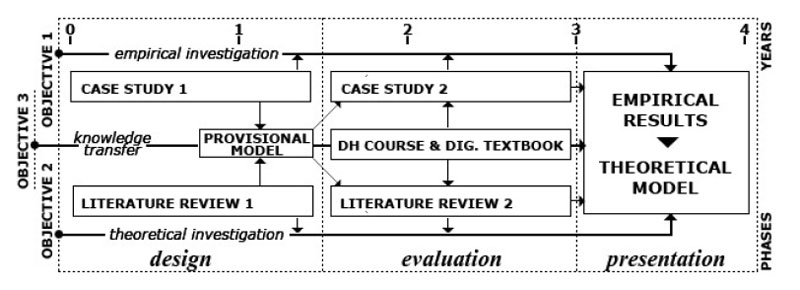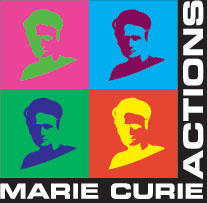PROJECT
Research objectives
The overall goal of this project is to gain better understanding of IB in DH activities, which will inform development of DH applications. This will be achieved through a combination of empirical, theoretical and action research, integrated into the main objectives of the study:
- to investigate information behaviour in digital humanities activities of scholars and students at the host university;
- to build a theoretical model for design and management of digital humanities applications, based on theoretical insights from several research fields, and the empirical knowledge gained by the objective 1; and
- to transfer knowledge to the host through an action research (development of a new DH course and a prototype of a digital textbook for the course) which will also enable an evaluation of the outcomes of the objectives 1 and 2.
The first objective of the project is to investigate information behaviour in digital humanities activities of scholars and students at the host university. The state of the art of IB field is dominated by user-centred and context-centred approaches. By constantly shifting their focus between user and context, or placing a priori users in a context, these approaches fail to trace users' own contextualisation, and limit information studies to a set of internal and/or external factors. This constant shifting of the focus between cognitive and social (and ignoring technological) actors is the main reason for the difficulty of existing IB approaches to capture the interplay between humans and technology. The project will utilise an ANT-informed IB model to address these difficulties, the model that offers an alternative to the existing IB approaches by extending agency to non-humans and focusing on relations between entities rather than on entities themselves. Following the relations between users and technology will provide a framework for in-depth analysis of IB in DH activities of scholars and students at the host university, which will be the main outcome of the objective 1.
The second objective is to build a model for design and management of DH projects, based on theoretical insights from several research fields, and the empirical knowledge gained by objective 1. A science policy briefing by European Science Foundation shows that complexity of disciplinary input in development of DH requires genuinely interdisciplinary co-development, rather than the historic model of client/supplier divisions with user requirements analysis, specification and coding. IB research must take seriously non-human (technological) actors, so crucial for DH and IS design, in order to influence IS design. This study will align ANT relational approach to the theoretical insights from the fields of IB, DH, and IS design, which will provide concepts that take in account both human (social/cognitive) and non-human (technological) aspects of IB. These theoretical concepts, together with the empirical investigation of participants' IB, will continually inform developing a model for design and management of DH projects, which will be the main outcome of the objective 2 of the study.
The third objective involves an action research, which will allow the researcher to transfer knowledge gained in Australia, but it will also enable evaluation of the objectives 1 and 2 through the main outcomes of this objective: development of DH course at the host, and a prototype of a digital textbook for the course. As noted, DH tools are becoming common components of university environments, and there is an increasing demand from students for training in DH. The new DH course will be created at the university, which will enable students to integrate digitally driven research goals, methods, and media with discipline-specific inquiry in collaborative projects. In addition, the project will enable the researcher to transfer his experience in using an innovative teaching methodology at Curtin University in Australia that uses an online asynchronous conference as an assessment tool. During the second phase of the project, a prototype of digital textbook will be developed for the course, which will evaluate a provisional model for design of DH applications, developed in the project's first phase. The work on the prototype will involve scholars and students from traditionally separated disciplines from computer science to philosophy, but also IT services such as database development and multimedia design. Therefore, the main outcomes of this objective will be a new DH course, the implementation of an innovative teaching methodology, and a prototype of digital textbook.
Overview of the main research activities
The combination of empirical (objective 1), theoretical (objective 2) and action (objective 3) research will ensure research and technological quality of the project. The project will start with two main research activities. One will follow a case study of development and implementation of a DH project at the host, and investigate participants' IB in their DH activities. Another will review the literature to explore possibilities to apply IB research in design of DH projects. These activities will provide empirical knowledge and theoretical concepts for building a provisional model as the first milestone of the project. The second phase will involve an action research - creating a DH course, and developing a prototype for a digital textbook for the course, based on the provisional model. This will enable an evaluation of the proposed model, and serve as a second case study. A report on evaluation phase, supported by another literature review, will mark the second milestone, which will lead to the final milestone: a proposition of new theoretical model. The figure below provide an overall picture of the main research activities that will be performed during 4 years of the project in relation to the main objectives, outcomes, and phases of the project. It is important to stress that the figure is merely an overall picture of the main activities as many activities will overlap and extend through several phases of the project. For example, the development of the digital textbook and the course will start during the design phase, but it will be the main activity only during the evaluation phase.





